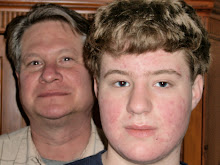Title: Thunderbolt and Lightfoot
Released: 1974
Genre: Offbeat crime caper
Notable for: Oscar nomination for best supporting actor
Coolest thing Clint does: Blows into bank vault with 20 mm cannon
Ten minutes into the film, Andrew's friend Preston looked up from his tacos and uttered four words that must have been spoken many times by Clint Eastwood fans.
"I don't get it," the kid said.
Just when Clint seemed securely pigeon-holed as the quiet but deadly cowboy/cop, he put out a movie that is completely different. It worked because "Thunderbolt and Lightfoot" is very entertaining and maybe even very good.
Here are some ways this is no regular Clint Eastwood movie: Everyone around Clint dies but he kills no one; people shoot at him repeatedly but runs instead of shooting back; as far as we know, he doesn't even have a gun; he is likable and smiles several times; by his standards, Clint has character growth and dialogue; and for maybe the first time ever, Clint plays a character who is supposed to be his real age, a Korean War veteran slightly past his prime.
Told you it was different.
It is difficult to describe the movie in any way that gives it justice. Clint basically leads a gang of robbers in an elaborate caper, but the story is punctuated by enough weird interludes that the overall flavor resembles a "Road Runner" cartoon.

At the start of the film, Clint is a soft-spoken preacher, for Christ's sake, delivering a sermon in slick-backed hair. Only a few moments are required to determine things are not as they appear. A dude walks into the church and starts shooting at the preacher. Clint runs away and flags down a passing car. It's a freshly-stolen vehicle driven by Jeff Bridges, who plays Lightfoot.
Lightfoot is, to put it mildly, a free spirit. He has a silly laugh, an abundance of self-confidence, mad driving skills and an engaging smile. A friendship and man-to-man affection develop, and Clint and Jeff become road buddies.
Clint is pursued by former colleagues who think he double-crossed them on an earlier robbery. They broke into a bank vault with a cannon, a crime famous enough that newspapers nicknamed Clint "The Thunderbolt." Loot from the robbery was hidden in a one-room schoolhouse but surviving gang members mistakenly believe Clint took it. They tracked him down when he was laying low by pretending to be a preacher.
Clint and Bridges go to the schoolhouse to get the money but discover the building is gone. It has been replaced by a new school. "Progress, I guess," Clint says.
Two surviving members of the old gang, led by a brutal mug played by George Kennedy, eventually track down Clint and Bridges. They are ready to execute them when instead the four decide to try the old robbery a second time.
An elaborate caper ensues, featuring an extended scene with Bridges in drag. The robbery appears to be a success, but it unravels quickly. One robber is shot by cops. Kennedy decides to take the money himself, but first he knocks Clint unconscious and gives Bridges a savage beating. Kennedy ends up being eaten by a dog, which seems fair.
Luck turns better for Clint and Bridges when they happen upon the old schoolhouse and find it still contains money from the first robbery. The school was not torn down, as they assumed, but moved to become a historical museum.
A happy ending is not in the cards.
Bridges is still messed up from the beating given by George Kennedy. Trying to smoke a victory cigar in the front seat of a Cadillac convertible, Bridges starts speaking to Clint with half of his face, like a stroke victim. He dies right there in the Caddy. Clint throws away the cigar and drives on.
"That was incredibly sad," Andrew said.
Clint brought the star-power to the billing but it is impossible to watch the film and think of him as the main man. Other actors, including two previous and future Oscar winners, were more compelling. Kennedy was great playing the dangerous guy. Bridges received an Oscar nomination as best supporting actor for his kick-ass portrayal of Lightfoot. He lost out to Robert DeNiro in "Godfather II," so we won't argue with the academy on that call. Brief and quirky appearances by character actors like Dub Tayor and the guy who played the "Squeal Like a Pig" rapist in "Deliverance" make a big impression.
If Clint consciously allowed other actors to outshine him, he deserves credit. That's something few mega-stars do.
A real man does not allow himself to be pigeon-holed. Clint, in his later films, made that obvious. Now we get it.
Next up: "The Eiger Sanction."


This is my favorite Eastwood film. Not only is it a good story, but it is shot so beautifully.
ReplyDeleteYeah, as an Eastwood nut, gotta say I love this one.
ReplyDelete